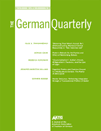
GERMAN QUARTERLY
Scope & Guideline
Connecting Scholars Through German Literary Discourse
Introduction
Aims and Scopes
- Interdisciplinary Approaches:
The journal integrates various academic disciplines, including literature, history, gender studies, and cultural studies, to provide a comprehensive understanding of German culture and its global implications. - Focus on Contemporary Issues:
GERMAN QUARTERLY emphasizes contemporary themes such as climate change, migration, and social justice, reflecting current societal challenges and the role of German studies in addressing them. - Cultural and Historical Analysis:
The journal publishes works that analyze cultural artifacts, historical narratives, and literary texts, often contextualizing them within broader socio-political frameworks. - Diversity and Inclusion:
There is a strong focus on marginalized voices and perspectives, including feminist, queer, and postcolonial viewpoints, aiming to broaden the scope of German studies. - Ecocritical Perspectives:
The journal explores ecological themes and the relationship between literature, culture, and the environment, contributing to the growing field of ecocriticism within German studies.
Trending and Emerging
- Climate Justice and Ecocriticism:
Recent papers increasingly address climate justice, highlighting the role of literature and the arts in advocating for ecological awareness and sustainability. - Decolonial Perspectives:
There is a rising trend in exploring decolonial perspectives within German studies, examining the implications of colonial legacies and advocating for inclusivity in narratives. - Queer and Trans Studies:
The journal is seeing a significant increase in works that focus on queer and trans studies, reflecting a broader societal recognition of LGBTQ+ issues and identities. - Migration and Multiculturalism:
Emerging themes related to migration, multicultural identities, and transnational experiences are gaining traction, illustrating the complexities of contemporary German society. - Digital Humanities and Technology:
The integration of digital humanities and the impact of technology on literature and culture are becoming more prominent, showcasing innovative methodologies in research.
Declining or Waning
- Traditional Literary Canon:
There is a noticeable decrease in papers focused solely on the traditional literary canon of German literature, as the journal increasingly prioritizes contemporary issues and diverse narratives. - Historical Nationalism:
Themes centered around historical nationalism and traditional interpretations of German identity are becoming less prevalent, as the journal moves towards more nuanced and intersectional analyses. - Eurocentrism in Studies:
The journal appears to be moving away from Eurocentric perspectives in favor of more global and transnational approaches, diminishing the prominence of studies that focus exclusively on German literature in isolation. - Formalism and Aestheticism:
There is a waning interest in purely formalist or aesthetic analyses of texts, with more emphasis now placed on socio-political contexts and the implications of literature in contemporary society.
Similar Journals
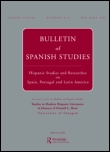
Bulletin of Spanish Studies
Advancing Scholarly Discourse in Spanish StudiesBulletin of Spanish Studies is a prominent academic journal dedicated to the exploration and discourse of Spanish studies within the diverse realms of Cultural Studies and Literature and Literary Theory. Published by Routledge Journals, Taylor & Francis Ltd, this journal serves as a crucial platform for scholars, researchers, and students to disseminate their findings and engage in scholarly debates related to Spanish literature, culture, and linguistics. With an emphasis on high-quality, peer-reviewed research, the journal holds a reputable Q3 ranking in Cultural Studies and a commendable Q2 ranking in Literature and Literary Theory, reflecting its significant impact within the academic community. The Bulletin is indexed in notable databases, achieving a rank of #314 out of 1106 in Literature and Literary Theory and #738 out of 1304 in Cultural Studies, signaling its vital role in advancing knowledge in these fields. Although it does not currently offer open access options, the journal remains an essential resource for those passionate about the study of Spanish culture and literature from 2010 to 2024 and beyond.

LINKS Rivista di letteratura e cultura tedesca
Navigating the Intricacies of German Cultural DiscourseLINKS Rivista di letteratura e cultura tedesca is a distinguished academic journal dedicated to the exploration and analysis of German literature and culture. Published by FABRIZIO SERRA EDITORE, this journal serves as a vital platform for researchers, professionals, and students who wish to delve into the intricacies of German cultural studies across various time periods and genres. With both ISSN 1594-5359 and E-ISSN 1724-1685, LINKS emphasizes scholarly rigor and multidisciplinary approaches, providing a space for innovative research and critical perspectives. Although the journal is not open access, it still plays a crucial role in advancing the understanding of German literature within the international academic community, contributing significantly to the field's ongoing dialogue and evolution. For those interested in enhancing their knowledge and engagement with contemporary issues in German studies, LINKS represents an essential resource.

Journal of Austrian Studies
Unveiling Austria's Cultural NarrativesThe Journal of Austrian Studies, published by University of Nebraska Press, serves as a vital academic platform dedicated to the exploration of Austrian culture, literature, and theory, making significant contributions to the interdisciplinary fields of Cultural Studies and Literature. Established in 2012, this esteemed journal boasts an ISSN of 2165-669X and an E-ISSN of 2327-1809, reflecting its commitment to broad scholarly communication. Despite being positioned in Q4 for Cultural Studies and Q3 for Literature and Literary Theory as of 2023, its focus on innovative research and critical discourse allows it to remain relevant in the academic community. With Scopus rankings indicating its niche yet important place among related journals, the Journal of Austrian Studies aims to foster understanding of Austria's rich cultural heritage and its contemporary implications, appealing to researchers, professionals, and students alike who seek rigorous analysis and scholarly debate. This journal provides an inclusive forum for sharing ideas and developments, contributing to the evolving dialogue in Austrian studies.
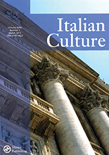
Italian Culture
Challenging Narratives, Celebrating Diversity in Italian CultureItalian Culture is a critical scholarly journal published by Routledge Journals, Taylor & Francis Ltd, focusing on the multifaceted nature of Italian cultural expressions from the 1970s to the present day. With an ISSN of 0161-4622 and an E-ISSN of 1559-0909, this journal serves as an essential platform for researchers and scholars interested in the nuanced dynamics of Italian cultural heritage, sociopolitical contexts, literature, and the visual and performing arts. Despite its current categorization in the Q4 quartile in various fields such as Cultural Studies and Literature, it remains committed to publishing insightful interdisciplinary studies that challenge conventional narratives and contribute to ongoing scholarly discourse. Notably positioned in the United Kingdom, it offers unique perspectives on Italian identity and cultural production, making it a crucial resource for students, professionals, and academics alike. The journal's scope and its convergence of cultural studies will undoubtedly stimulate academic engagement and exploration within and beyond its established readership.

COLLOQUIA GERMANICA
Unveiling New Perspectives in Language and Literary TheoryCOLLOQUIA GERMANICA, published by FRANCKE VERLAG, serves as a vital platform for the dissemination of scholarly research in the fields of linguistics, literature, and literary theory. With a rich history spanning from 2002 to 2017 and again from 2020 to 2024, this journal is indexed under ISSN 0010-1338 and is recognized within Q4 quartile rankings in both Linguistics and Language, and Literature and Literary Theory as of 2023. Although it operates primarily on a subscription basis, this journal endeavors to enhance academic discourse and promote innovative research that contributes to our understanding of Germanic languages and literature. Researchers and professionals can greatly benefit from the journal's content, given its position in Scopus with notable rankings and percentiles in various categories. COLLOQUIA GERMANICA invites submissions that offer fresh insights into the intricacies of language and literature, making it an essential read for academics and students alike.
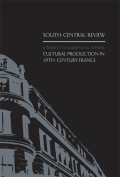
South Central Review
Challenging Perspectives in the Heart of Cultural StudiesSouth Central Review, a distinguished academic journal published by Johns Hopkins University Press, serves as a vital platform for scholarly discourse in the fields of cultural studies, literature and literary theory, philosophy, and the visual and performing arts. With an ISSN of 0743-6831 and an E-ISSN of 1549-3377, this journal is dedicated to highlighting innovative research and critical analyses that explore the complexities of Southern culture and its broader implications. Although it operates without an open access option, the journal is recognized for its rigorous peer-review process and contributions to contemporary academic dialogue, holding Q3 and Q4 rankings across several disciplines as of 2023. The convergence of ideas and perspectives from diverse academic backgrounds positions the South Central Review as an essential resource for researchers, professionals, and students seeking to deepen their understanding of the cultural narratives shaping our world today.
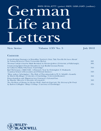
GERMAN LIFE AND LETTERS
Celebrating Eight Decades of German Literary ScholarshipGERMAN LIFE AND LETTERS, published by WILEY, is a distinguished academic journal that has been a vital resource in the fields of Literature, Cultural Studies, and Sociology since its inception in 1936. With an impressive history spanning over eight decades, the journal is currently indexed with an E-ISSN of 1468-0483 and continues to serve as a critical platform for scholarly discourse and research across its converged years, encompassing materials from 1936 to 2024. Although classified in the Q4 and Q3 quartiles for various categories, its contributions significantly enrich our understanding of German literature and culture. Researchers, professionals, and students will find in this journal a captivating repository of insights, fostering a deeper appreciation for the interconnections between literature and socio-political themes. Unfortunately, it does not offer open access, but its wealth of knowledge and rigorous academic standards make it an essential read for those engaged in these disciplines.

NEUE RUNDSCHAU
Illuminating Contemporary Cultural DialoguesNEUE RUNDSCHAU is a prominent journal published by S Fischer Verlag GmbH, specializing in the fields of literature and literary theory, as well as visual arts and performing arts. With its roots tracing back to its inception in 1969, this journal has evolved significantly, providing a platform for critical discourse and innovative scholarship in the arts and humanities. Although it experienced coverage changes, the journal remains a vital resource for researchers and academics, contributing to the rich dialogue surrounding cultural studies and artistic expression. Furthermore, while it is not available through open access, NEUE RUNDSCHAU offers essential insights into contemporary literary trends and artistic movements, ensuring its relevance and importance within the academic sphere. With Scopus rankings including a position in the 16th percentile for literature and literary theory, and a 10th percentile placement in cultural studies, the journal embodies a commitment to quality scholarly contributions, making it an invaluable asset for students, professionals, and researchers alike.

Studien zur Deutschen Sprache und Literatur-Alman Dili ve Edebiyati Dergisi
Exploring the richness of German language and literature.Studien zur Deutschen Sprache und Literatur-Alman Dili ve Edebiyati Dergisi is an esteemed academic journal published by ISTANBUL UNIV, FAC LETTERS, dedicated to the vibrant exploration of German language and literature, alongside critical studies in cultural contexts. Operating with an Open Access model since 2017, the journal facilitates unrestricted dissemination of knowledge, ensuring accessibility for researchers, educators, and students worldwide. Based in Turkey, this journal plays a significant role in the scholarly community, as evidenced by its rankings in Cultural Studies, Linguistics, and Literature and Literary Theory. Although it currently holds a Q4 ranking in Cultural Studies and Linguistics and a Q3 ranking in Literature for the year 2023, it offers invaluable perspectives that contribute to ongoing dialogues in these fields. The journal has established convergence from 2021 to 2024, creating a cohesive platform for the latest research and discussions in German linguistics and literary theory, and invites submissions from scholars aiming to enhance the understanding of the Germanic domain.
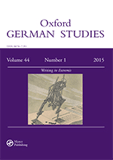
OXFORD GERMAN STUDIES
Illuminating the Intersections of Language and LiteratureOXFORD GERMAN STUDIES, published by Routledge Journals, Taylor & Francis Ltd, is an esteemed academic journal dedicated to the exploration and scholarly examination of German literature and linguistics. With an ISSN of 0078-7191 and E-ISSN of 1745-9214, this journal has been in circulation since 1966, offering researchers a unique platform for critical discourse, innovative research, and interdisciplinary dialogue. It holds a significant position in the academic landscape, being categorized in the Q4 quartile for Linguistics and Language and Q3 for Literature and Literary Theory as of 2023. Despite lacking open-access options, the journal thrives in providing invaluable insights, aiming to bridge historical contexts with contemporary perspectives on German studies. It serves as an essential resource for scholars, professionals, and students eager to deepen their understanding of Germanic languages and literature. Located in Abingdon, United Kingdom, the journal continues to uphold its mission of advancing knowledge and fostering scholarly discussions in the rich field of German studies.